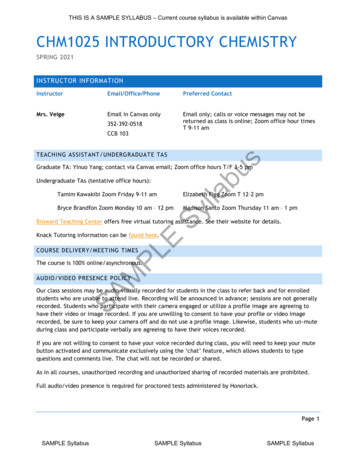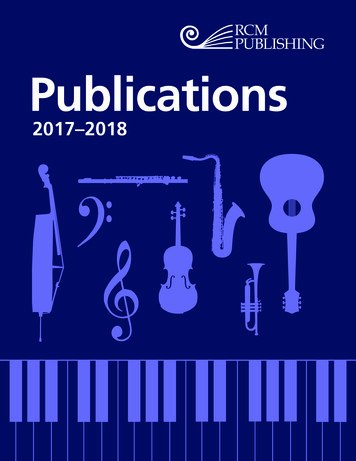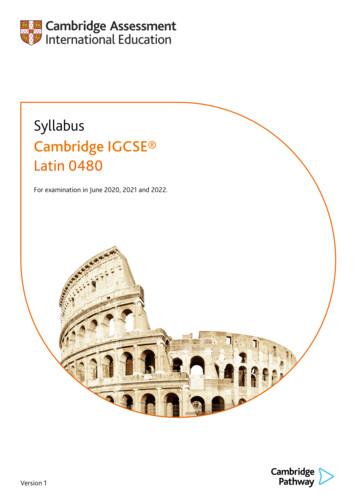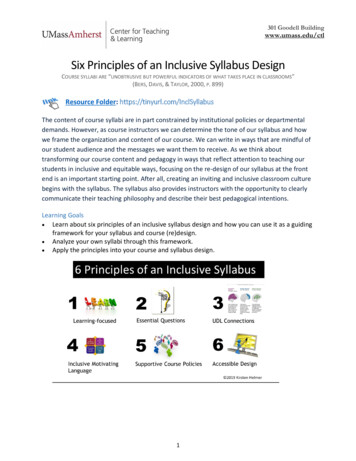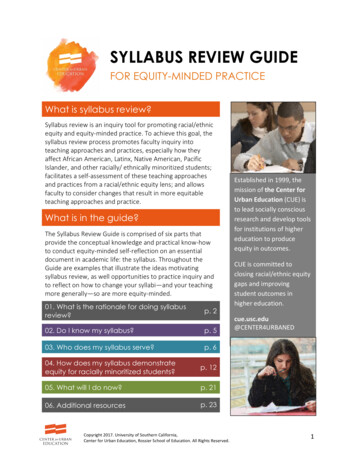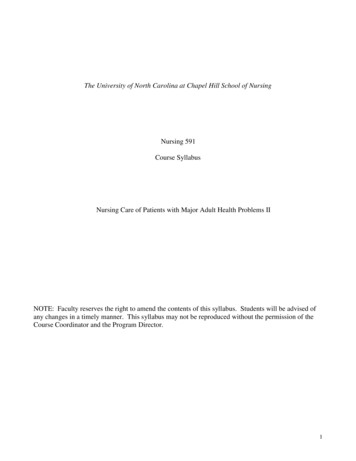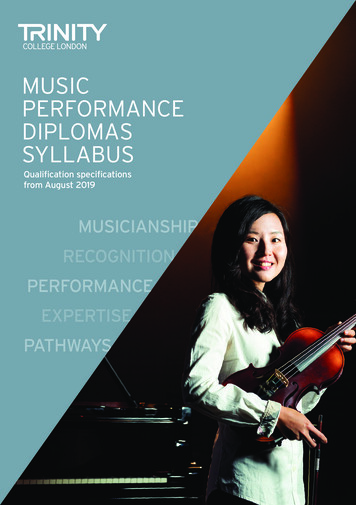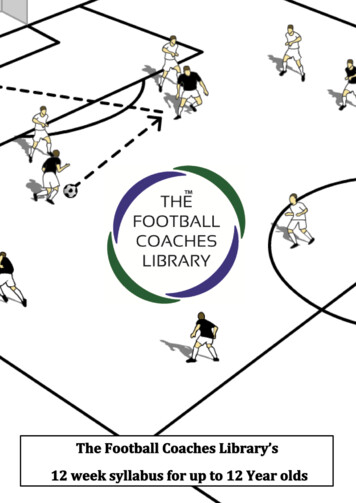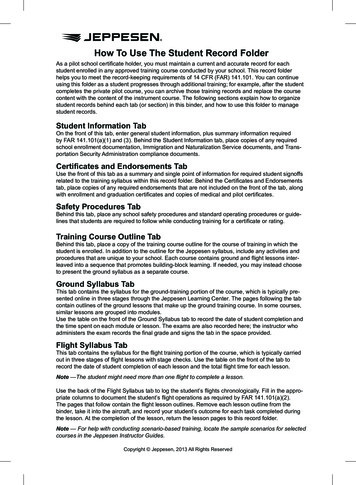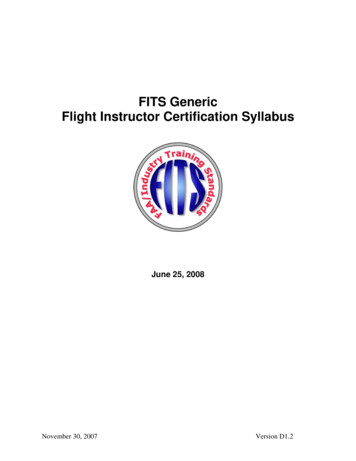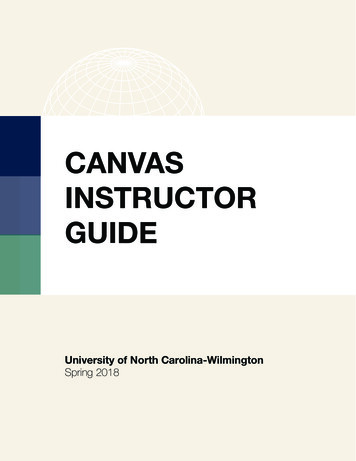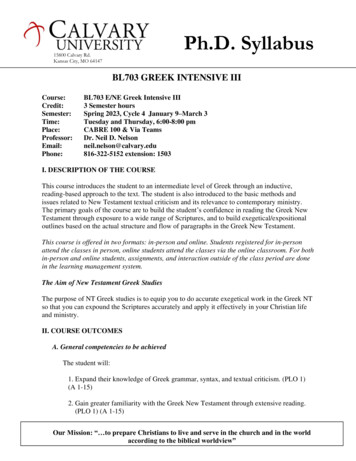
Transcription
Ph.D. Syllabus15800 Calvary Rd.Kansas City, MO 64147BL703 GREEK INTENSIVE il:Phone:BL703 E/NE Greek Intensive III3 Semester hoursSpring 2023, Cycle 4 January 9–March 3Tuesday and Thursday, 6:00-8:00 pmCABRE 100 & Via TeamsDr. Neil D. Nelsonneil.nelson@calvary.edu816-322-5152 extension: 1503I. DESCRIPTION OF THE COURSEThis course introduces the student to an intermediate level of Greek through an inductive,reading-based approach to the text. The student is also introduced to the basic methods andissues related to New Testament textual criticism and its relevance to contemporary ministry.The primary goals of the course are to build the student’s confidence in reading the Greek NewTestament through exposure to a wide range of Scriptures, and to build exegetical/expositionaloutlines based on the actual structure and flow of paragraphs in the Greek New Testament.This course is offered in two formats: in-person and online. Students registered for in-personattend the classes in person, online students attend the classes via the online classroom. For bothin-person and online students, assignments, and interaction outside of the class period are donein the learning management system.The Aim of New Testament Greek StudiesThe purpose of NT Greek studies is to equip you to do accurate exegetical work in the Greek NTso that you can expound the Scriptures accurately and apply it effectively in your Christian lifeand ministry.II. COURSE OUTCOMESA. General competencies to be achievedThe student will:1. Expand their knowledge of Greek grammar, syntax, and textual criticism. (PLO 1)(A 1-15)2. Gain greater familiarity with the Greek New Testament through extensive reading.(PLO 1) (A 1-15)Our Mission: “ to prepare Christians to live and serve in the church and in the worldaccording to the biblical worldview”
BL703 Greek Intensive III23. Expand their Greek vocabulary. (PLO 1) (A 1-15)4. Grow in confidence in handling the text of the Greek New Testament. (PLO 1)(A 1-15)5. Continue to develop in the use of the Greek New Testament in teaching and ministry.(PLO 1) (A 1-15)B. Specific competencies to be achievedThe student will:1. Learn principles of Greek grammar and syntax through an inductive study of selectedNT passages. (PLO 1) (A 1-15)2. Learn to follow the flow and argument of the authors of the New Testament throughGreek clausal structural layouts or “phrasing” and paragraph flow summaries. (PLO 1)3. Review or learn all Greek vocabulary words which occur 30 or more times in the NewTestament. (PLO 1) (A 1-15)4. Be able to work their way through passages in the New Testament with increasingspeed by the use of minimal, but specialized helps. (PLO 1) (A 1-15)5. Appreciate and enumerate the basic issues involved in the study of textual criticism.(PLO 1) (A 1-15)6. Understand and evaluate the various philosophies and methods of textual criticism.(PLO 1) (A 1-15)7. Read and understand the textual apparatus of the UBS text. (PLO 1) (A 1-15)8. Evaluate specific textual problems in the New Testament. (PLO 1) (A 1-15)9. Employ textual criticism in the process of Greek exegesis. (PLO 1) (A 1-15)10. Apply what he or she has learned to the interpretation and teaching of the Greek NewTestament. (PLO 1) (A 1-15)11. Integrate all material learned in the course into an “exegetical” on a specific passageselected by the student, which will provide the base for teaching that passage in thefuture. (PLO 1) (A 1-15)
BL703 Greek Intensive III3III. REQUIRED TEXTBOOKSA. BibleThe Bible is a required textbook in every course at Calvary University. To facilitateacademic level study, students are required to use for assignments and research an Englishtranslation or version of the Bible based on formal equivalence (meaning that the translationis generally word-for-word from the original languages), including any of the following:New American Standard (NASB, English Standard Version (ESV), New King James(NKJV), or King James (KJV). Other translations and versions based on dynamicequivalence (paraphrases, and thought-for-thought translations like NLT and NIV) may beused as supplemental sources. Please ask the professor if you have questions about aparticular translation or version.B. Other Textbooks1. James R. White. The King James Only Controversy. Second (Updated Expanded)Edition. Minneapolis: Bethany House, 2009.ISBN: 978-07642060542.Cost: 15.99.J. Harold Greenlee. The Text of the New Testament. Peabody, MA: Hendrickson, 2005.ISBN: 978-1-59856-240-8 Cost: 18.00.3. Murray J. Harris. Colossians & Philemon. Exegetical Guide to the Greek NewTestament. Nashville: B & H Academic, 2010.ISBN: 978-0805448498Cost: 25.75.4. Darrell L. Bock & Buist M. Fanning, eds. Interpreting the New Testament Text.Wheaton, IL: Crossway, 2007.ISBN: 978-1581344080 Cost: 34.04.C. Required: Original Language Bible Study Software (Accordance, Logos)Students are required to have digital resources to engage Biblical study in the originallanguages, including but not limited to Biblia Hebraica Stuttgartensia (BHS), Nestle Aland28 Greek New Testament – both including apparatus; Septuaginta (LXX), A Greek Lexicon ofthe New Testament and Other Early Christian Literature (BDAG) by Bauer, Danker, Arndt,and Gingrich; Hebrew and Aramaic Lexicon of the Old Testament (HALOT) by Koehler andBaumgartner.
BL703 Greek Intensive III4D. Recommended BooksIt is also assumed that you have The Greek New Testament with Dictionary. United BibleSocieties, 5th rev. edition with Dictionary. German Bible Society, 2015. ISBN: 978-1619701397.Cost: 46.97. It is necessary for textual criticism.IV. REQUIREMENTSA. ReadingYou will be expected to read and study the books by Greenlee and White dealing with textualcriticism and portions of the books by Harris and Bock & Fanning dealing with exegesis.B. QuizzesThere will be regular grammar, translation, phrasing, and vocabulary quizzes on the assignedpassages in the syllabus, and quizzes on textual criticism. They are designed to enable you towork through, understand, and exegete the Greek NT. Please handle the quizzes as they weremeant to be taken. It will pay great dividends in the future, as you will really come to understandthe Greek New Testament. You must use an unmarked Greek New Testament on the quizzes.C. AttendanceThe student is responsible to see that his/her attendance is recorded on the final exam.D. PapersYou will write a 5 page paper explaining your philosophy of textual criticism. An example paperwill be distributed. This paper is worth 5% of the overall grade.You will also choose and write up two Textual Critical problems (about 2 pages each).You will write an exegetical paper 11–14 pages in length. This “exegetical” will be on a specificparagraph from Colossians. In it you will incorporate “phrasing,” a paragraph flow summary,grammatical observations, textual critical decisions, and a synthesis section.E. ExamThere will be a Final exam covering phrasing, grammatical categories, translation, Greekparagraphs and sentences, textual criticism, and the use of Greek in ministry.
BL703 Greek Intensive III5F. Analysis of a SermonThe student will collect, transcribe, and analyze a sermon (preferably spoken) which uses Greek,describing how Greek was used, whether it was used in the most effective manner, andsuggesting two other ways Greek could have been used effectively in the sermon. This analysiswill be two pages in length. It will be turned in along with a copy of the transcript of the sermonbeing analyzed. The student should try to collect this sermon as early in the semester aspossible. No late submissions of this assignment are allowed.G. Phrasing/Paragraph Flow Assignments in Philippians and ColossiansThe student will phrase, exegetically outline, and do a paragraph flow on Phil 1:3–11 andColossians 1:15–20.V. ASSIGNMENTS# 1. Proficiency Exam# 2. Phrasing from Mounce’s Workbook# 3. Identify the Most Important Verbs in Phil 1:3-4# 4. Identify the Most Important Genitives, Datives and Accusatives in Phil 1:3-4# 5. Identify the Most Important Patterns in the Text Phil 1:3-4# 6. Phrasing and Exegetical Outline of Phil 1:3-11# 7. Phrasing and Exegetical Outline of Col 1:15-20# 8. Quiz on Col 1 passage# 9. All Reading Due#10. Sermon Analysis, Use of Greek due#11. T.C. Problems 1 and 2 due#12. Textual Criticism Quiz#13. Philosophy of Textual Criticism#14. Exegetical Paper on Passage in Colossians#15. Final ExamVI. ASSIGNMENT POINTS, GRADING SCALE AND FINAL GRADEASSIGNMENT POINTSReading in White, Mounce, Harris, and GreenleePhilosophy of Textual Criticism Paper2 T.C. Problem PapersPhrasing AssignmentsExegetical Assignment on Col 1:15-20Sermon AnalysisQuizzesFinal ExamExegetical Paper and PresentationTotal points100 points50 points50 points150 points100 points50 points100 points200 points200 points1000 points
BL703 Greek Intensive III6GRADING SCALE AND FINAL � 859AAB BBFPROPOSED SCHEDULE/TOPICSWeek 1:Introduction to Course.Greek Reading and Phrasing.Introduction to Phrasing and Exegetical OutliningWeek 2:Work on phrasing from Mounce’s workbookBring your first year Mounce workbook to classReview grammar and vocabularyTurn in phrasing from Mounce workbookProficiency Exam over all words occurring 50 times in the NT, grammar, and translation(counts as a quiz)Introduction to Paragraph Flow Analysis of Phil 1:3–11. Phrasing, ParagraphFlow, and Exegetical Outlining to be done according to the handouts distributedand discussed in classWeek 3:Phrase Phil 1:3–11Discussion of important verbs, use of tense, voice, and moodBegin reading textbooks by White and Greenlee on Textual CriticismIdentify important verbs, use of tense, voice, and mood in Phil 1:3–11Discussion of use of genitives, datives, and accusatives.Read Mounce’s Graded Reader, 144–161Week 4:Identify use of genitives, datives, and accusatives in Phil 1:3–11Discussion of patterns in the textIdentify patterns in the text for Phil 1:3–11Discuss exegetical outlining of Phil 1:3–11Discuss Final “Exegeticals”
BL703 Greek Intensive III7Week 5:Exegetical Outlining of Phil 1:3–11Phrasing and exegetical outlining on Col 1:15–20 discussedDiscuss Final “Exegeticals”Phrasing and exegetical outlining on Col 1:15–20Quiz on passage in Col 1Textual CriticismDiscussion of Textual Criticism. Handouts on T.C.Week 6:Read: White, v–viii, 1–271. Discussion of Textual CriticismDiscussion of textbookRead Greenlee. Discussion of Textual CriticismSermon Analysis (Use of Greek) due. Students choose their textual critical problemsT.C. problems #1 and #2 due and discussed in classWeek 7:Quiz over Textual Criticism5 page paper: My Philosophy of Textual Criticism due (How to do it and its importance)Watch and Analyze Video (KJV/Textus Receptus only camp)Hand in passage of your choice from Colossians. It should contain a textualcritical problem in the UBS or NA apparatus. This passage will be the basis of your exegeticalpaper.Discuss “Exegeticals”Review for FinalWeek 8:Exegetical PapersFinal ExamHELP FOR STUDENTS, REMINDERS AND EXPECTATIONSRemember to always save and back up your assignments.Students with disabilities have the responsibility of informing the AccommodationsSupport Coordinator (aso@calvary.edu) of any disabling condition that may requiresupport.Plagiarism is defined as copying any part of a book or paper without identifying theauthor. This also includes taking another person’s ideas and presenting them as yourown.
BL703 Greek Intensive III8The Clark Academic Center (learning@calvary.edu) is dedicated to providing freeacademic assistance for Calvary University students. Student tutors aid with all facetsof the writing process, tutor in various subject areas, prepare students for exams andfacilitate tests. Please take advantage of this service.All class papers must follow the Turabian style according to A Manual for Writers ofResearch Papers, Theses, and Dissertations, 8th edition and the Calvary Style Guide,2019 update.
4. Grow in confidence in handling the text of the Greek New Testament. (PLO 1) (A 1-15) 5. Continue to develop in the use of the Greek New Testament in teaching and ministry. (PLO 1) (A 1-15) B. Specific competencies to be achieved The student will: 1. Learn principles of Greek grammar and syntax through an inductive study of selected NT passages.

